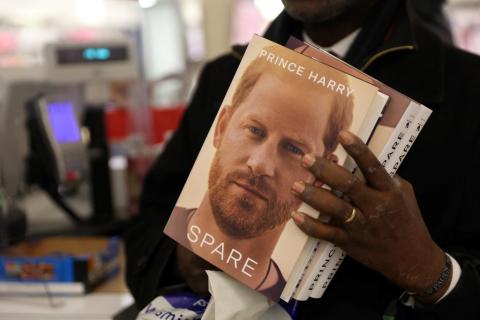
The term “ghostwriting” was coined by Christy Walsh, whose agency for years controlled the literary output of American sports celebrities from Babe Ruth onwards. The agency had a series of rules. One suggested that a new ghostwriter “usually makes the mistake of thinking that he ought to write the way his celebrity talks. That is an error. He ought to write the way the public thinks his celebrity talks.”
Prince Harry’s ghostwriter, JR Moehringer, wrote his own memoir before he started to write the lives of others. In that book, The Tender Bar, he describes how he was on an existential, drink-sodden search for surrogates for his absent father – a New York DJ – mostly among the regulars in his local boozer. That quest, he suggested, instilled in him a quality that has no doubt subsequently been prized by his celebrity subjects (who include Andre Agassi as well as Harry): “I was a master at ‘identity theft’ when that crime was more benign. The bar fostered in me the habit of turning each person who crossed my path into a mentor, or a character, and I credit the bar, and blame it, for my becoming a reflection, or a refraction, of them all,” he wrote.
No doubt Moehringer was chosen to write the prince’s confessional because he seemed a kindred spirit, wronged and voluble. You also suspect, though, that like all writers, Moehringer will have seen the project as another way to write about himself.
In the beginning
The genesis story of social media is often taken to be the tale of CommuniTree, which is also a tale of Eden and the fall. CommuniTree was among the first open-access digital forums, created in Santa Cruz, California, in 1978, when modem-linked personal computers were whirring into life. The discussion board allowed like-minded enthusiasts to discuss any subject they wished; users described it, in the beginning, as “the post-industrial cybernetic computopia to come!”.
For a couple of years, the tone on its bulletin boards was one of mutual respect and positive energy. This changed, however, when some high-school teenagers armed with modems trashed CommuniTree, taking free speech to abusive extremes.
Barbarians, or “trolls” as they became known among older members, ignored the rules, encouraging violence, spoiling it for everybody. The CommuniTree founders couldn’t cope with the bullying and eventually shut the forum down.
Those founders would have been amused, no doubt, to hear Elon Musk talk about his new “liberated” $44bn Twitter as a “digital town square”, where a “wide range of beliefs can be debated in a healthy manner”. Computopias spring eternal.
Who dares
Watching a preview of tonight’s new BBC series Rogue Heroes about the origins of the SAS (written by Peaky Blinders creator Steven Knight) brought to mind the time I once spent in the company of Andy McNab. The Bravo Two Zero author came into the Observer office undercover to talk about an autobiography he’d written, Immediate Action.
In answer to several of my questions about his life – about the fact he was left as a baby for adoption in a Harrods carrier bag on hospital steps, or about the experience of witnessing friends die in various covert operations – the SAS hero had a stock answer: “You just crack on.”
That philosophy also applied to his relationships. He was three times divorced. The second parting, he described thus: “I threw a few things in a bag, went to the first floor window and jumped.” Why not use the stairs? I wondered. “Well, you just crack on…”
Tim Adams is an Observer columnist












